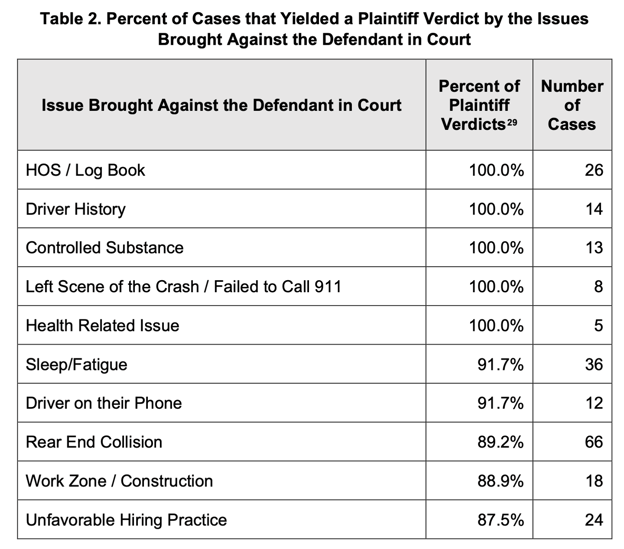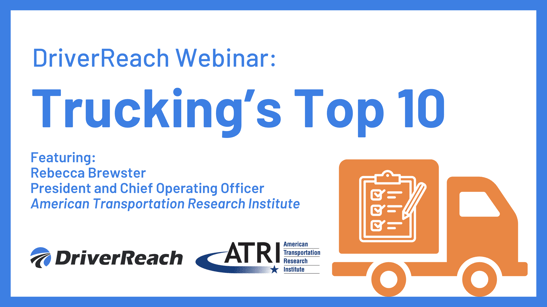A billion dollars was difficult for Dr. Evil to grasp in the Austin Powers movies, but not so much for the plaintiffs’ bar in the United States. The number and size of jury verdicts in the trucking industry have risen sharply over the past decade, so it was only a matter of time before we started hearing of billion-dollar awards. That time is now.
In late 2021, a Florida jury awarded $1 billion to the family of Connor Dzion, an 18-year-old college student who was killed in a truck accident in 2019. Connor had been driving on I-95 near Jacksonville when he encountered stopped traffic due to an accident caused by a driver of a company called AJD Business Services. While waiting for the accident to be cleared, Connor was struck and killed by a driver for another motor carrier called Kahkashan Transportation.
According to the evidence in the case, the AJD driver was on his cell phone, driving over his hours-of-service limits, and was improperly licensed when he caused the initial pile-up. The Kahkashan driver was speeding, egregiously over his hours-of-service limits, and could not read the flashing warning signs that were alerting him to the stopped traffic ahead. Both companies were implicated in the resulting lawsuit.
$100 million of the jury award in this case came in the form of compensatory damages, intended to compensate Connor’s family for his wrongful death. The remaining $900 million came as punitive damages, intended to punish AJD and Kahkashan for their non-compliant, bad behavior.
This is a cautionary tale to all motor carriers; non-compliance can ruin lives and cost you your business. Nowhere is this more apparent than in cases, like the Florida one, where commercial drivers’ qualifications are called into question. What are you doing to keep non-compliant and unsafe drivers off the road?
A HUGE issue in highway accident litigation
The American Transportation Research Institute (ATRI) is a non-profit whose mission is to conduct transportation research, with an emphasis on the trucking industry’s essential role in a safe, efficient, and viable transportation system. In 2020, it published a shocking report titled “Understanding the Impact of Nuclear Verdicts on the Trucking Industry,” in which it explored the significant uptick in multi-million dollar verdicts against trucking companies over the past decade.
The data points from ATRI’s study paint an ominous picture. In 2004, there were just four reported cases in which a verdict exceeded $1 million against a trucking company. In 2013, that number had jumped to more than 70. As of 2018, the average dollar amount in truck/bus accident cases surpassed $22.2 million, a ten-fold increase from the $2.3 million average in 2010!
Perhaps most alarming of all was the data in Table 2 of ATRI’s report that detailed the percentage of cases that yielded a plaintiff verdict, categorized by the issues involved in the cases. Notably, of the 14 nuclear verdict cases involved in the study where the commercial driver’s “driving history” was a problem, 100% of them resulted in a plaintiff’s verdict. Not even one led to a defense verdict! Likewise, of the 24 cases in which the motor carrier was alleged to have engaged in “unfavorable hiring practices,” 87.5% of those cases went the plaintiff’s way.

Link to ATRI report: Understanding the Impact of Nuclear
Verdicts on the Trucking Industry, June 2020
What’s clear from the data is that when motor carriers fail on the driver qualification front, bad things tend to happen. When they do, there’s often a big price to pay. And that’s not just on the litigation front. The uptick in these types of cases has caused insurance premiums to jump dramatically—by 35-40% on a year-over-year basis for the past five years for low- to average-risk carriers, says ATRI, which has forced many carriers out of business or to cut costs elsewhere simply to survive.
Lessons learned
So what driver-qualification lessons can carriers take away from the billion-dollar Florida verdict and others like it? I think there are three:
- Follow the rules – Trucking is heavily regulated, at least from a safety perspective. Carriers and their drivers are expected to understand and follow thousands of rules governing the operation of commercial vehicles on public roadways. Many of these rules pertain to driver qualification, specifically. For their part, carriers are required to take specific steps to vet their drivers’ qualifications before putting them out on the road and periodically thereafter. These rules are the bare minimum, in terms of what is expected of regulated trucking companies. If you don’t follow these rules, you really stand no chance in highway-accident litigation, as we saw in the Florida case.
- Follow the trends – Recognizing the rules are the floor, it’s rarely enough to simply comply with them. What are you doing that goes above and beyond the regulations to ensure your drivers are safe? That’s the question the plaintiffs’ attorneys and juries are asking, and if your answer is “nothing,” there’s a real risk you’ll be punished for it. In my experience, carriers are too focused on regulatory exposure that could stem from non-compliance. That’s really the least of your concerns. Your gaze should be higher. What are my competitors and others in the industry doing to improve safety, even if those things aren’t technically required by law? Asking that question and working to adhere to industry best practices as resources allow will go a long way to minimize your highway-accident exposure.
- Follow your gut – If it doesn’t feel right, it probably isn’t. I have to think AJD Business Services felt like it was fundamentally wrong to allow a driver who was not properly licensed out on the road. Had it followed that instinct and disqualified the driver, it wouldn’t have been in the position that it was. I recommend that carriers make a habit of asking themselves “how will my actions play to a jury.” If the answer is “not favorably,” then stop what you’re doing!
Leveling the playing field
While most of the contributors to nuclear verdicts are fully within a motor carrier’s control, some are not. Occasionally, the deck is stacked against them. Certain state laws and court rules, for example, can lead to lawsuit abuses, where trucking companies become victims of unfair litigation tactics. These can lead to a carrier’s reputation, rather than the accident at hand, being put on trial and resulting in jury awards that far exceed any actual damages sustained by the plaintiffs in the case.
Fortunately, many state trucking associations are fighting back against lawsuit abuse. For example, Florida and Texas, both of which have historically been considered “judicial hellholes” for trucking companies, have recently passed tort reform laws specifically intended to curb various unfair litigation tactics.
As more and more states begin passing similar laws, the hope is that nuclear verdicts attributable to lawsuit abuse will decline. But even if that comes to pass, motor carriers will remain exposed to significant liability when their own acts or omissions contribute to serious accidents. For that reason, they must remain vigilant.
About Brandon Wiseman
Brandon is a transportation attorney, safety consultant, and the founder of Trucksafe Consulting. Over the years, he has had the privilege of representing some of the nation's leading motor carriers and transportation providers on matters relating to USDOT safety and compliance.









